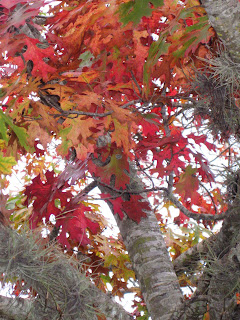I grew up with my toes in the Willamette River.
 |
| Crossing the Willamette River Eugene, Oregon, February 21st, 2011 (from I'd rather be riding... ) |
Why such love, such fascination?
In its nature, water teaches us impermanence, in the Buddhist sense of the term:
According to the teachings of the Buddha, life is comparable to a river. It is a progressive moment, a successive series of different moments, joining together to give the impression of one continuous flow. It moves from cause to cause, effect to effect, one point to another, one state of existence to another, giving an outward impression that it is one continuous and unified movement, where as in reality it is not. The river of yesterday is not the same as the river of today. The river of this moment is not going to be the same as the river of the next moment. So does life. It changes continuously, becomes something or the other from moment to moment. (from Urban Dharma)
 |
| Loblolly Creek, Gainesville, Florida © 2011 by Friends of Nature Parks |
The other day, on a rainy walk to the local creek with my dear friend and her dog, I witnessed such a lesson in very simple terms. The dog was thrilled with a tennis ball that we had discovered, and he was chasing it and carrying it around as he bounded up and down the creek. Spotting an interesting stick, he placed the ball in the shallow water. A few minutes later, tiring of the stick, he returned for the ball, only to find that it had disappeared downstream. He looked up to us, confused. Why is my ball gone? Who took it? In our grief and our loss, we often look skyward, confused. Why? But this is just the nature of the world, as gentle and as reasonable as the flowing creek. And we do not mourn each ripple as it flattens and disappears. We call such perpetual motion beautiful.
Yet this is not really about loss, but about change. In its nature, water also teaches us a kind of permanence. It is liquid, gas, or solid. It is internalized and externalized. It remains a continuous, dynamic entity, paradoxical in its changing faces. And it is in the continuity and connectivity that we find something akin to hope.
Ecclesiastes 1:7 All the rivers run into the sea; yet the sea is not full; unto the place from whence the rivers come, thither they return again.
Yet this is not really about loss, but about change. In its nature, water also teaches us a kind of permanence. It is liquid, gas, or solid. It is internalized and externalized. It remains a continuous, dynamic entity, paradoxical in its changing faces. And it is in the continuity and connectivity that we find something akin to hope.
Ecclesiastes 1:7 All the rivers run into the sea; yet the sea is not full; unto the place from whence the rivers come, thither they return again.
 |
| Conceptual Photos by Olaf Mueller |
There is also another water we all know: the primal water of the womb. When else are we embraced so entirely and so safely? When else are we touched by another so completely? The healing, often magical power of touch is a taste of what we once knew: nearly total connection, before the first shock of becoming separated and, perhaps, feeling lost.
Camelia Elias, in her blog Taro(t)flexions, writes of the honesty evoked through touch and visualization:
 |
| Underwater: Photos by Erin Mulvehill |
When water encircles our bodies, we are also vulnerable and touched. This offers another reminder of our erstwhile selfless selves, a vague yet urgent thirst for the unity we knew in a time beyond memory.
Yet the water out here is not insular. It carries us or it passes us by. It cannot bear to stay still. Still waters stink and fester. Stagnant, they invite diseases and no longer draw our loving gaze.
My Willamette is not a pretty opal shine, steady and posing for a grateful human eye. This is my Willamette:
"Nothing was, nothing will be, everything has reality and presence" (Siddhartha, Herman Hesse, trans. Hilda Rosner, 1951, p. 87).
Siddhartha listened. He was now all ears, completely absorbed in his listening, completely empty, completely receptive; he felt that he had now learned all that there was to learn about listening. He had often heard this all before, these many voices in the river, but today it sounded new. By this time he could no longer distinguish the many voices, could not tell the gleeful ones from the weeping ones, the children’s voices from the grown men’s; they all belonged together, the lament of longing and the knowing man’s laughter, the cry of anger and the moans of the dying; it was all one, it was all interwoven and knotted together, interconnected in a thousand ways. And all of this together, all the voices, all the goals, all the longing, all the suffering, all the pleasure, all the good and evil, all of this together was the world. All of this together was the river of events, the music of life. And whenever Siddhartha listened attentively to that river, that song of thousand voices, when he listened neither to the sorrow nor the laughter, when he tied his soul not to any individual voice, entering into it with his self, but instead heard them all, perceiving the totality, the oneness, then the great song of a thousand voices consisted of a single word, which was om, the absolute. (Siddhartha, Herman Hesse, found here)
In what is left, do we find the soul of us, the divine spirit, the one sentience? Is that what we water-leaning, toe-dipping creatures truly seek?
